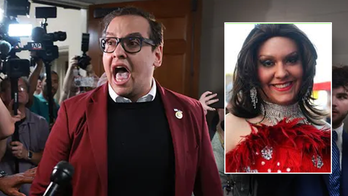
July 02, 2005. Madrid, Spain. Day of the Pride Gay. Parade. This year, the gays and lesbians collective celebrated the law that authorizes the marriages between couples of the same sex, recently approved. (Photo by Quim Llenas/Cover/Getty Images) (Getty Images)
A year after Argentina became the first Latin American country to pass legislation to legalize homosexual civil unions, the gay marriage debate has heated up, as several countries consider similar bills.
Just this past week, Chilean President Sebastián Piñera proposed a law to recognize the unions, granting unmarried partners some of the same rights as married couples.
In Colombia, they’re following this trend, with the constitutional court recently telling Congress to come up with a piece of legislation regarding gay unions within the two years. It informed the legislative body that same-sex couples constitute families and should be allowed to have the rights of heterosexuals.
“What the court said is that the constitution protects all types of families that may exist in Colombian society,” says Bibiana Muñoz, an attorney for the rights organization LGBT of Colombia (Lesbian, gay, bisexual, transgender). “It recognizes that couples of the same gender not only have patrimonial interests, but they also have a bond that brings them together in lasting relationships.”
Muñoz points out that Congress has already scrapped six law projects that were seeking the recognition of the rights for gay couples. But she believes the court decision provides a new advantage by establishing some basic rights for partners that must be guaranteed by Congress.
In contrast to the new ruling, Colombia's conservative inspector general, Alejandro Ordoñez, has declared that he will ask the court to nullify it, saying that he’s concerned about its opinion that the concept of family is subject to “evolution” and a “changeable character.” Ordoñez is well known for his devout Catholic stances, serving as a strict opponent to issues like gay marriage and abortion.
Regardless of the decision, conservatives are still happy that the court ratified Article 113 of the constitution's civil code, which states that marriage can only exist between one man and one woman. However, that cannot prevent Congress from giving rights to gay civil unions.
The wording of the Colombian constitution says that it protects “all types of families.” And the court’s argument is that homosexual couples fall under that description. Gay marriage proponents actually see Ordoñez’s determination to petition as useless due to the fact that the legal document states that it’s technically legal.
So conservatives are having a hard time fighting against it. Supporters say that it’s almost irrelevant to have an argument about whether marriage should only be between a man and a woman because the law doesn’t specify it.
“[The inspector general] has no competence to doubt the court’s acknowledgement that gay families are considered families as well,” Muñoz explains. “The marital union right has been approved by the court and that right is totally immovable. So no action could go against it, or deteriorates it.”
Lawmakers, whether they agree or not with ruling, have already begun to propose pieces of legislation. Miguel Gómez Martínez, a conservative Colombian congressman, has introduced a bill that would grant gay Colombians civil unions, but rules out adoption rights. The union would grant some rights regarding property and access to healthcare and pension plans.
But while Gómez’s version of the bill follows the court decision, he says it would not grant homosexual partners adoption rights because "a family is a bond between a man and a woman through marriage...so this (bill) cannot affect that figure."
The constitutional court has given Congress a June 2013 deadline to figure out the legislation.
David Noto is the Latin American correspondent for Fox News Radio in Bogotá, Colombia.
Follow us on twitter.com/foxnewslatino
Like us at facebook.com/foxnewslatino




